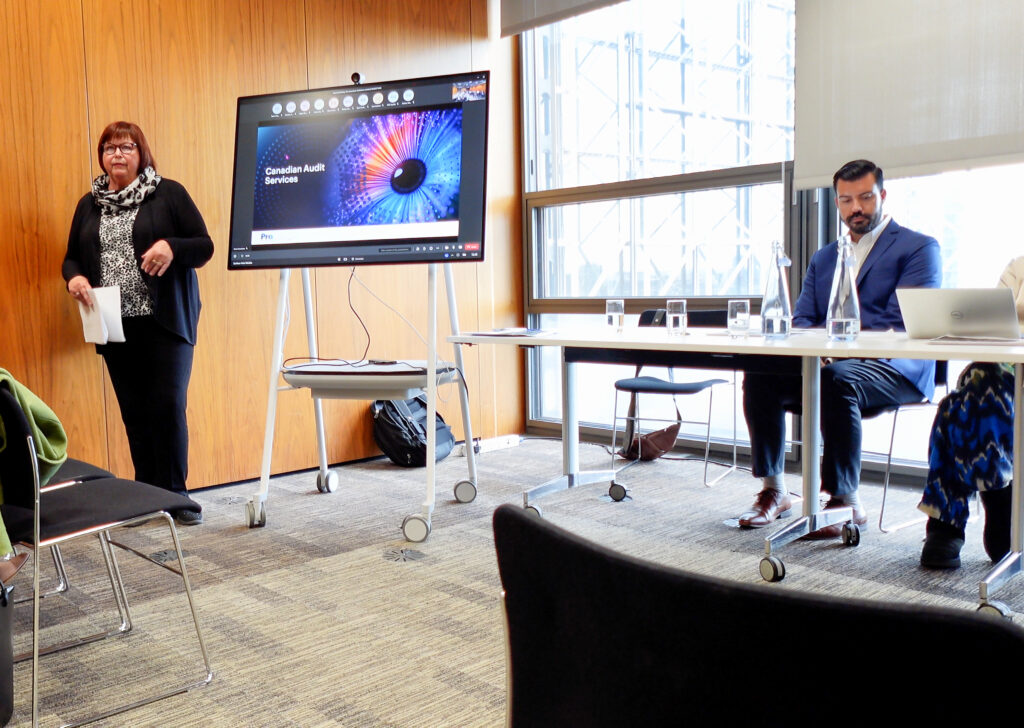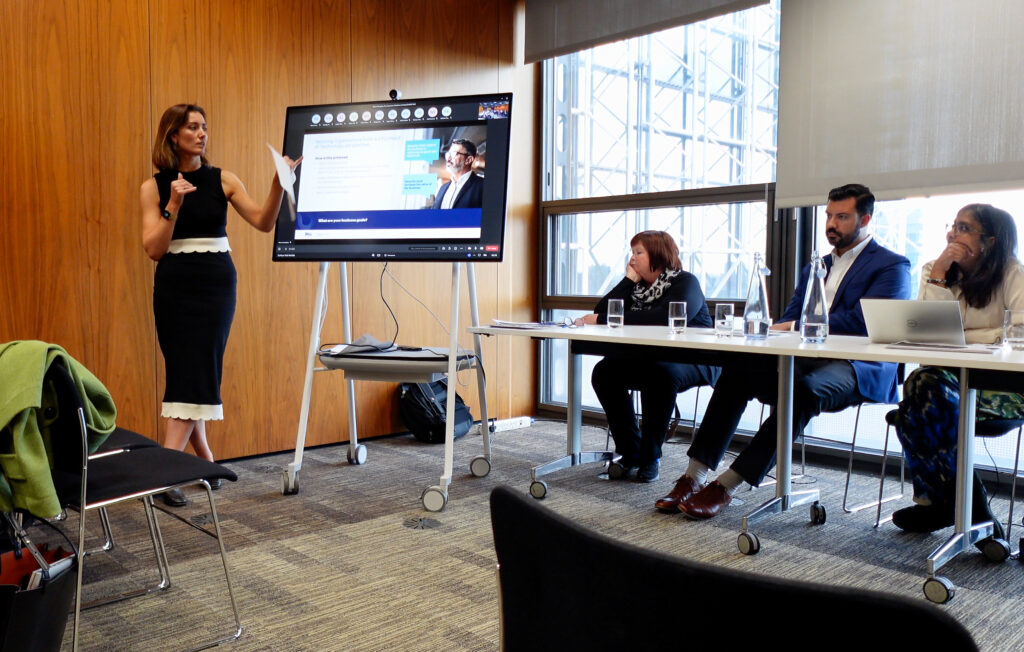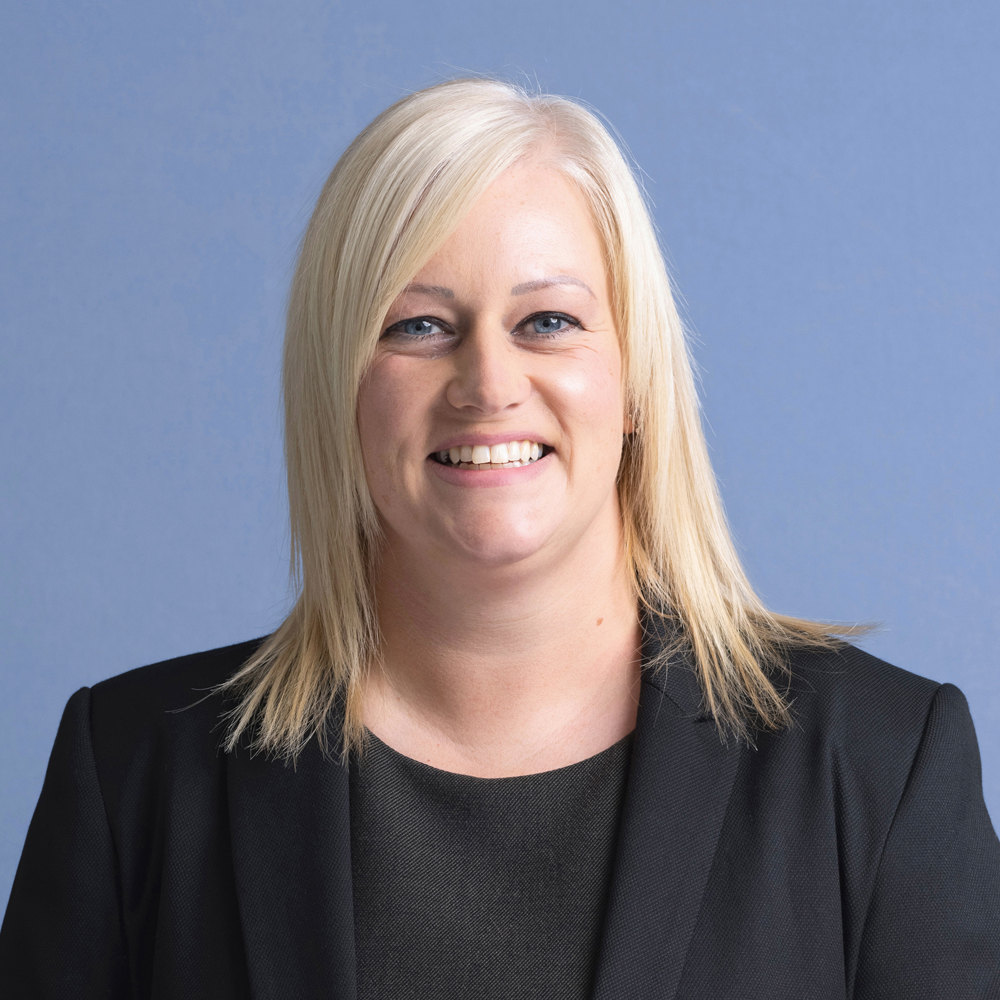Nurturing young talent and showcasing a pathway for progression is vital for piquing the interest of employees in their formative years. But attracting those whose careers are yet to begin is a different ball game.
For 16-year-old Izzy Joy, her career options range as wide as the alphabet, though a career in insurance may just be the ticket.
“Insurance really wasn’t what I thought it was going to be when I first came and I didn’t know what to expect.” After spending a week with Pro MGA Global Solutions, Izzy’s eyes have opened wide to the board spectrum of roles that sit within our industry. “It’s made me realise that I really do enjoy insurance and it’s much more broad and varied than I thought it would be.”
The week saw Izzy move across departments, working and shadowing various different roles within the company, and even included a visit to the Lloyd’s building and a trip to the MGAA 2024 Annual Conference.
“Attending the MGAA conference really helped to develop my knowledge of all that insurance entails. Getting the chance to attend client meetings that focused on business development, understanding more about the media and advertisement branch of Pro MGA, talking to and understanding the job roles for different members of the team, as well as participating in a vlog, made for a really enjoyable experience.”
But insurance is just policies, claims and renewals, isn’t it?
“This week has really helped me to realise that having a work and social balance is possible and this has been created here at Pro MGA. I also enjoyed the experience of being able to build relationships, and network within the insurance industry, surrounded by the best group of people. Everyone in the team was happy to answer any of my questions and were extremely welcoming. I’m so glad I got the opportunity to do my work experience here.”
There was even time for a game of crazy golf for Izzy and the team.
At Pro MGA Global Solutions, we’re keen to show the future workforce that insurance is a creative space, where individualism and ideas are welcome. The industry is moving at a rapid pace thanks to technology, and innovative minds will only help to continue that momentum.
“I got a great insight into the realm of insurance and was able to start to discover how insurance really works. Thank you to the team at Pro MGA!”.
Thank you to Izzy too, for her enthusiasm, hard work and dedication. We hope to see Izzy, and many others like her, enter our world of opportunity.
Hear more from Izzy on her week at Pro MGA Global Solutions in the vlog linked above on Pro Global TV.
To speak to the Pro Global team please feel free to reach out to us at:

To contact our PR team directly please use the link below
This article is shared with the kind permission of Intelligent Insurer.

That is according to Danny Maleary, chief executive officer of Pro MGA Global Solutions, who said he believes the agility and efficiency of the structure means it has a permanent place in the industry.
Pro MGA Global Solutions is a service provider to the sector, offering “MGA-in-a-box” packages which enable an MGA’s owners to focus on underwriting and capital-raising.
“The MGA will be the future of insurance if it is structured correctly, embraces the right operating model, uses technology, and offers good service,” he told Monte Carlo Today.
“That nimble approach is ultimately what the customer is looking for, whether that customer is an individual or the corporate. That is where the MGA excites me.”
“The Popularity Of The Structure Lies In Its Agility.”
There is no shortage of new entrants into the market, said Maleary, who began the business in 2016.
“We see 10 to 15 proposals a month which is an increase over the last couple of years from the five to 10 we would normally see,” he said. Of those, Pro MGA typically brings on about 15 new clients a year.
It currently works with 46 MGAs writing $600 million of gross written premium over 30 classes of business.
Maleary said the popularity of the structure lies in its agility and its ability to adopt and use cutting-edge technology.
“We are seeing a significant shift with insurers, reinsurers and alternative risk capital looking to support MGAs,” he said. “MGAs are very much at the forefront of the chief underwriting officer’s mind in terms of how they grow.
“Whether it is MGAs they own, or MGAs they support as third parties, there is a suite of platforms where they can offer their capital out, and that trend is going to continue to move upwards.”
Maleary added that MGAs were attractive to entrepreneurially-minded underwriters who wanted more autonomy than they might get in a large company, and that investors of all stripes were interested in supporting MGAs.

Name: Danny Maleary
Job title: CEO, Pro MGA Global Solutions
To speak to the Pro Global team please feel free to reach out to us at:

To contact our PR team directly please use the link below
London, UK, 12th September 2024 – Pro MGA Global Solutions, the independent managing general agent (MGA) incubation division of leading trusted advisor for the specialist insurance sector Pro Global, is delighted to announce the appointment of Haris Khan as the new Head of Solutions and Markets, effective 1 November 2024. Haris brings a wealth of experience in the delegated authority sector, having previously served as the Delegated Underwriting Manager at Lloyd’s.
With this strategic appointment, Pro MGA Global Solutions is poised to enhance its market offerings and accelerate growth into 2025, aligning with its mission to nurture and attract top talent in the MGA incubation sector.
Haris’s extensive expertise will play a pivotal role in delivering exceptional value to clients, supporting the company’s growth ambitions, and expanding its footprint in key global markets.
Danny Maleary, CEO of Pro MGA Global Solutions, commented:
“We are thrilled to welcome Haris to our leadership team. His proven track record and deep understanding of delegated authority make him an invaluable addition to our company. Pro MGA Global Solutions anticipates robust growth throughout 2025, and we plan to further expand our team to ensure the brightest minds are driving our solutions. As we continue to build on our successful trajectory, offering an equal blend of business and technical expertise to our clients, whether they are entrepreneurs, brokers, underwriters, or insurtech firms, Haris’s leadership will be crucial in driving our expansion and ensuring that we remain at the forefront of innovation in the delegated authority sector. With Haris on board, I am confident that we will continue to deliver outstanding results for our clients and partners.”
Haris Khan, Head of Solutions and Markets, added:
“I am excited to join Pro MGA Global Solutions at such a dynamic time in the company’s growth journey. Danny and the team have laid a strong foundation for success, and I am eager to contribute to their sustainable growth by enhancing our market solutions and driving innovation. My focus will be on delivering tailored, strategic support to our clients, empowering them to achieve their ambitions and thrive in a competitive market. Together with the talented team at Pro MGA, I am confident that we will lead the way in shaping the future of the MGA sector.”

To speak to the Pro Global team please feel free to reach out to us at:

To contact our PR team directly please use the link below
The FCA’s recent speech on Consumer Duty, delivered by Sheldon Mills, emphasises the crucial need for insurance firms to rigorously assess and evidence the outcomes their customers receive. Mills reiterated that “Consumer Duty is not a one-off task, but an ongoing commitment.”

This reminder from the regulator adds urgency to the continuous efforts insurers must undertake to align with these expectations. The speech sheds light on the current landscape, offering both positive examples of best practice, and areas where firms are falling short in outcomes monitoring. For insurers, it is essential not only to understand these findings but also to proactively address any identified gaps to ensure compliance and maintain customer trust.
Key Takeaways
Emphasis on Outcomes Over Processes: Mills highlighted a common pitfall among firms—an excessive focus on process completion rather than the actual outcomes for customers. This approach can lead to a disconnect between regulatory compliance and customer-centric service delivery. Insurers must shift their focus to defining clear customer outcomes and selecting metrics that directly reflect these goals.
Comprehensive and Analytical Reporting: The effectiveness of monitoring hinges on the comprehensiveness and analytical depth of the data reported. Many firms were found lacking in this area, with reports providing limited insights into customer outcomes due to insufficient or inadequately analysed data. Enhancing the quality of data and ensuring robust analytical frameworks are crucial steps forward.
Proactive Remediation: The FCA has observed that evidence of proactive measures taken to address identified poor outcomes was notably sparse. Insurers must prioritise not only identifying but also acting upon areas where customer outcomes are suboptimal. This requires a dynamic and responsive monitoring system that facilitates timely interventions.
Tailored Monitoring Approaches: The speech highlighted that the most effective monitoring systems are those tailored to the specific strategies, products, and target markets of the firm. Generic or process-focused metrics often fail to capture the nuances of customer experiences. Firms should develop bespoke monitoring frameworks that align with their unique operational contexts.
Next Steps for Insurers
We would urge insurers to redefine and align the metrics they track with outcomes—and for some, this may involve revisiting their monitoring frameworks, ensuring that metrics are not just indicators of process completion but are directly tied to customer outcomes. It is important to set clear, specific outcomes and choose relevant metrics that can provide genuine insights into whether these outcomes are being met.
Investing in data quality improvements and advanced analytical tools is also crucial. Firms should aim to collect comprehensive data and conduct in-depth analyses to derive meaningful insights. This might include leveraging advanced analytics and machine learning to predict and preempt potential poor outcomes.
Establishing a culture that prioritises proactive responses to monitoring insights is essential. This means fostering an environment where potential issues are promptly addressed, and continuous improvement is ingrained in the firm’s ethos. Regular training and awareness programmes can help instil this mindset among staff.
The FCA’s update on Consumer Duty serves as a crucial reminder of the ongoing responsibilities insurers hold towards their customers. Each insurer must craft a monitoring approach that resonates with its strategic objectives and operational realities. This involves understanding the unique needs of their customer base and designing metrics that accurately reflect the quality of service delivered. Engaging with customers to gather feedback can also provide valuable perspectives for refining these frameworks.
A Reminder of Proactive Responsibilities
By adopting a proactive audit perspective, insurers can not only ensure compliance but also enhance their client relationships and, ultimately support sustainable long-term growth. At Pro Global, we are committed to supporting our clients in navigating these regulatory landscapes, fostering a culture of excellence and customer-centricity in the insurance sector.
Get in touch to find out more.
Further Reading:
Tightening up: New FCA rules

Name: Pervin Sivanathan
Job title: Group Head of Audit & Advisory
To speak to the Pro Global team please feel free to reach out to us at:

To contact our PR team directly please use the link below
This article is shared with the kind permission of P&C360

Louisiana has recently updated its regulations for managing general agents (MGAs) through House Bill 672, aligning many aspects with the National Association of Insurance Commissioners (NAIC) Model Act. While some changes are technical or conform to the NAIC Model, the new legislation introduces additional financial reporting requirements and other obligations for MGAs and their associated insurers, effective August 1, 2024.
These changes are partly in response to a series of insolvencies among Louisiana insurers that use affiliated MGAs. The amendments extend existing laws and apply broadly to MGAs, managing general underwriters (MGUs), program administrators, insurers, and investors. Key provisions include quarterly financial reporting by MGAs, regulatory notifications for certain financial thresholds and events, mandatory independent audited financial reports, expanded examination rights for regulators, and a prohibition on persons involved in prior insurer insolvencies from acting as MGAs.
House Bill 672 reflects a broader trend towards increased scrutiny and regulation of the growing MGA sector, driven by concerns over rapid insurance growth and the risk of insolvencies. This legislative response underscores the heightened regulatory environment MGAs now face, particularly around robust data documentation and underwriting guidelines. Ultimately, regulators view MGAs and TPAs as extensions of insurance carriers. This perspective necessitates that MGAs and TPAs uphold the same standards of compliance, transparency, and diligence as the carriers themselves.
At Pro Global, our recent analysis of over 200 U.S. audits reveals critical insights into the current state of compliance within these entities. Our audits uncovered an average of five findings per engagement, with 55% classified as high-priority issues. Key areas requiring immediate attention include compliance policies and procedures, accurate and complete policy documentation, adherence to authorized binding limits, and appropriate/diligent sanctions checking. These deficiencies underscore the need for MGAs to bolster their internal controls and compliance frameworks.
One of the most pressing TPA issues identified is poor claims handling, which not only affects customer satisfaction but also exposes companies to significant financial and reputational risks. Ineffective reserving practices and inadequate coverage analysis further exacerbate these challenges, potentially leading to regulatory penalties and financial losses. To address these issues, it is imperative that MGAs and TPAs enhance their claims management processes, ensuring timely and accurate claims processing and reserving.
Moreover, proactive audits and claim peer reviews play a vital role in strengthening overall risk management and governance policies. Regular audits not only ensure compliance with regulatory standards but also help businesses become more resilient to unforeseen challenges. By rigorously examining internal controls and operational processes, audits mitigate financial, reputational and conduct risks and enhance the reliability and accuracy of business operations.
Cybersecurity is another critical area that requires attention. With the increasing reliance on digital platforms and data, MGAs and TPAs are vulnerable to cyber threats. Implementing robust cybersecurity measures and conducting regular vulnerability assessments can help protect sensitive data and maintain the integrity of business operations.
The key takeaway for carriers, MGAs, TPAs, and compliance teams is clear: the regulatory landscape is evolving, and the focus is sharpening on delegated authority structures in North America. Louisiana’s recent amendments through House Bill 672 epitomize the heightened regulatory scrutiny that MGAs and TPAs now face in their rapidly growing corner of the insurance market. These changes, driven by a need to address past insolvencies and ensure robust financial practices, reflect a broader trend towards increased oversight. As MGAs and TPAs are seen as extensions of insurance carriers, they must adhere to the same standards of compliance, transparency, and diligence.
North America’s growing and dynamic population of MGAs and TPAs must rise to the occasion by strengthening their compliance frameworks, enhancing their operational processes, and prioritizing cybersecurity. Proactive audits and continuous improvement are the keys to navigating this evolving landscape successfully. By doing so, MGAs and TPAs can not only keep pace with regulatory expectations but also drive sustainable growth and build a solid and compliant foundation for the future. A proactive approach to continuous improvement is key – audits are not just tick box exercises, nor are they limited to a “once and done” approach. MGAs and TPAs take note!

Name: Robert Sherman
Job title: US Head of Audit & Advisory
To speak to the Pro Global team please feel free to reach out to us at:

To contact our PR team directly please use the link below
This article is shared with the kind permission of Insurance Journal.

Ensuring Accurate Exposure Reporting
Accurate reporting of exposures is the cornerstone of premium audits, which are conducted in order to determine the exposure basis for an insurance policy – such as payroll, sales, or vehicle count – at the end of a policy period in order make a final calculation of premium and premium taxes, according to a definition from the International Risk Management Institute. The Rating Bureau requires yearly audits, and while some carriers may waive them, the threshold for estimated or waived audits is low in the industry.
The audits ensure that the right premiums are charged, reflecting the actual risk insured. This accuracy benefits not only the insurers but also the policyholders and their agents. For the policyholders, paying the correct premium means they are not overcharged and can potentially benefit from downstream cost savings through appropriate experience modification adjustments.
Agents also stand to gain from accurate reporting, as their commissions are often adjusted based on the revised exposures calculated during the audit. Moreover, accurate exposure reporting informs the future rate-making process of states and helps carriers apply appropriate loss cost modifiers. This, in turn, affects the earned premium, influencing loss ratios and combined ratios, which are vital for larger enterprise-wide decision-making.
The importance of accurate exposure reporting is underscored by data from the National Council on Compensation Insurance (NCCI), which shows that incorrect classifications and underreported payrolls can lead to significant discrepancies in premium calculations.
A study by the Century Foundation found that worker misclassification has a direct impact on higher workers’ compensation insurance premiums, stating: “As misclassification is fundamentally a process to evade required taxes and insurance, it is revealing that the three Northeast states (Vermont, Connecticut, and New Jersey) with the highest estimated rates of misclassification are also in the top five in the country in terms of the cost of workers’ compensation insurance premiums.”
Tackling Potential Premium Leakage
Premium leakage remains a significant challenge in the insurance industry. It often occurs due to misclassification of workers, underreporting of payroll, and the use of uninsured subcontractors. A common issue is the misclassification of subcontractors and independent contractors, particularly in states with stringent classification tests like California’s ABC test, which is used to determine whether a person is an employee or an independent contractor. Ensuring subcontractors have proper workers’ compensation coverage and validating their levels of independence is crucial.
Another area of concern is the interchange of labor, where employees are classified incorrectly according to state manual rules. Detailed interviews with business owners and officers to understand their duties and levels of management can help apply the correct classification codes. Accurate documentation of job duties and the defense of all classifications is essential. Additionally, understanding temporary staffing and labor broker agreements is crucial for assigning appropriate classifications.
Data from the Coalition Against Insurance Fraud indicates that workers’ compensation premium fraud costs insurers an estimated $25 billion annually. Addressing premium leakage through thorough audits can significantly reduce this financial burden. For example, substantial financial gains are achievable through productive audit practices, which can help transform a negative return premium – where a carrier is at risk of missing critical information at the time of audit (hidden exposure, subcontractors etc.), which in turn decreases the premium amount. This could have adverse effects on expense and loss ratios, thus having a direct impact on combined ratios and overall profitability.
Addressing Non-Compliance Issues
Non-compliance with state and regulatory bureau guidelines is a pervasive issue that can lead to severe penalties and financial losses for insurers. Proactive measures are essential to address non-compliance, starting with educating policyholders throughout the lifecycle of the policy. Premium audits often serve as one of the few touchpoints with customers, making it crucial to communicate the benefits of compliance clearly.
This is a time where the customer works directly with the carrier auditor or third-party audit firm. They will receive electronic or physical mail requests for information, requests to upload material to portals and fill out worksheets etc. Therefore, it is important that the carrier thinks of the process through a lens of customer experience and success as it could be the only time they are talking with a customer through the life of the policy.
While non-compliance surcharges and potential non-renewal or cancellation are traditional tactics, focusing on the customer’s experience and showcasing the benefits of compliance can be more effective. Customer journey mapping can identify critical touchpoints, ensuring that the premium audit process enhances rather than detracts from the customer relationship.
Engaging with state bureaus and industry associations such as the National Society of Insurance Premium Auditors (NSIPA) can provide valuable insights into best practices and regulatory updates. Being part of these networks helps insurers stay ahead of potential compliance issues and adopt industry-leading practices.
A proactive approach to compliance can also involve leveraging technology. Remote and AI-powered auditing solutions are becoming more prevalent, offering increased accuracy and efficiency. These tools can analyze large datasets to detect patterns and anomalies, providing a robust defense against non-compliance and fraud.
Ensuring Best Practice
The role of premium audits in the U.S. insurance industry is more critical than ever – a yearly audit is recommended and a substantial requirement at the rating bureau level. Ensuring accurate exposure reporting, tackling premium leakage, and addressing non-compliance are fundamental to maintaining financial stability and fostering trust with policyholders. By adopting thorough and proactive audit practices, insurers can mitigate risks, enhance accuracy, and ultimately drive better financial outcomes.
However, the path forward requires decisive action. Insurers must be proactive in implementing rigorous premium audits and maintaining stringent checks and balances to prevent non-compliance and financial losses. This proactive stance involves investing in advanced auditing technologies, engaging in continuous education for policyholders and agents, and fostering strong relationships with regulatory bodies and industry associations.
The stakes are high: inaccurate reporting, unchecked premium leakage, and non-compliance can lead to significant financial and regulatory repercussions. Conversely, a robust premium audit framework can not only protect against these risks but also unlock substantial financial gains, as evidenced by operational transformations seen by Pro Global that yielded up to 18% additional premium on productive audits.
Insurers can set higher standards for their premium audits by adopting the following practices:
The time to act is now. By prioritizing these measures, insurers can safeguard their financial health, improve customer satisfaction, and strengthen the integrity of the insurance industry. The commitment to proactive premium audits and stringent checks and balances will not only prevent financial loss but also ensure a more resilient and trustworthy insurance ecosystem.

Name: Robert Sherman
Job title: US Head of Audit & Advisory
To speak to the Pro Global team please feel free to reach out to us at:

To contact our PR team directly please use the link below
This article is shared with the kind permission of Insure TV.
In an insightful discussion with Insure TV, Hans Døhlen discusses how Pro MGA supports MGAs from early stages, driving growth and expansion in the UK, Europe, and the US, with plans for Latin America and DIFC.
Please click on the video link below to view.

Name: Hans Martin Døhlen
Job title: Managing Director, Pro MGA Solutions Europe GmbH
To speak to the Pro Global team please feel free to reach out to us at:

To contact our PR team directly please use the link below

The event brought together industry experts and leaders to discuss the latest trends and challenges in the auditing world, highlighting the increasing scrutiny of Third-Party Administrators (TPAs/DCAs) and the growing cyber threats facing the industry. With insights from Pro Global’s Audit Team and experts from Cyber Security Associates (CSA), attendees gained actionable strategies to navigate the complexities of regulatory requirements and cyber defense. Here are the key takeaways from this dynamic and informative session.
Regulatory Trends and Audit Findings: Increasing scrutiny of MGAs & TPAs
Robert Sherman, U.S. Head of Audit & Advisory at Pro Global, kick started the event by highlighting some significant regulatory trends in the region, : “The Property and Casualty (P&C) market in the U.S. is expected to grow by 7% in 2024, with a notable rise in the use of Managing General Agents (MGAs) and Third-Party Administrators (TPAs). As a result of this regulators are emphasising the importance of robust data documentation and underwriting guidelines; viewing MGAs as extensions of carriers.”
Key findings presented at the event by Robert, from Pro Global’s analysis of 200 U.S. audits, revealed that compliance, policy documentation, adherence to binding limits, and sanctions checking are areas needing attention. The audits showed an average of five findings per engagement, with 55% of these being high-priority issues. Compliance lapses, poor claims handling, and inadequate coverage analysis also emerged as significant risks, potentially leading to financial losses and regulatory penalties.
Similarly, he emphasised how an audit helps enhance overall risk management and governance policies, making businesses more resilient to unforeseen challenges while safeguarding their reputation. In addition, it ensures compliance with regulatory standards, reducing risks and building trust with stakeholders. Moreover, audits pinpoint and address conduct-related issues, promoting ethical practices and reinforcing the company’s integrity and transparency. By rigorously examining internal controls and operational processes, audits also mitigate financial risks, ensuring the reliability and accuracy of business operations.
The key takeaway for attendees was that regulators are increasingly scrutinising MGAs and TPAs/DCAs, and proactive audits are critical to ensuring ongoing compliance and best practice.
Cybersecurity Threats and Defense
Phil Cordey, Operations Director at CSA, then provided an in-depth overview of the evolving cyber threat landscape. He warned that ransomware incidents remain the top threat to businesses, with active criminal gangs targeting insurance companies and using collated information to infiltrate their third-party partners. These groups specialise in conducting sophisticated reconnaissance and penetration testing, making them formidable adversaries.
He stressed the importance of using comprehensive audits to tackle increasingly sophisticated attempts to hijack a company’s core systems and data: “AI is increasingly being used in both cyber-attacks and cyber defense, balancing an increase in attempted incidents with better monitoring and automation to prevent complete compromise of organisations’ IT systems. Data protection remains a critical concern, with inadvertent data leaks through services like ChatGPT posing significant risks, a breach that many companies are unaware and unprepared for.”
To mitigate these threats, Phil emphasised the importance of putting in place stringent security audit assessments, available to organisations using globally recognised frameworks like NIST – used by most, if not all, U.S. based companies – ISO 27001, the Centre for Internet Security, and the UK’s National Cyber Security Centre’s Cyber Assurance Framework & Cyber Essentials Frameworks.
Confirmation was provided that companies can obtain technical assurance of their security controls through Penetration Tests, Gap Analysis Assessments, or a combination of both using Cyber Due Diligence Assessments.
Phil added: “These are three important active steps that companies should undertake to cement and assure themselves they are on the right security journey in line with budget and strategic considerations.”

Canadian law and regulation
Elaine Collier, Senior Auditor (Canada), in her session, talked to the importance of Bill 96 and increased regulatory scrutiny:
“A year after Bill 96, known as Law 14, came into effect in June 2023, questions about its implementation continue to dominate discussions. The legislation, which enforces French as the official and common language of Québec, gave MGAs and contract writers a year to comply, though no audits have been conducted to ensure adherence.”
In response, Pro Global has developed a specific audit approach to evaluate compliance, finding that whilst some organisations already had French-language policies in place, others struggled with the requirement to issue French documents first, followed by English versions if requested.
A key recommendation for companies is to establish a clear policy on handling Bill 96 and effectively communicate this to staff. Eliane stressed that the “French First” rule remained untested in courts, adding to the regulatory uncertainty.
“Additionally, we observed instances where policies were issued in French but included English endorsements, highlighting the need for thorough audits to ensure full compliance. Another grey area involves handling policies written outside Québec or companies with both English and French names, which cover holders need to address carefully under binding authority agreements.”
Elaine also highlighted how regulatory scrutiny is intensifying in other provinces. Specifically, in Ontario, the Council of Registered Insurance Brokers of Ontario regulates MGAs, although licensing is not yet mandatory. However, the Financial Services Regulatory Authority of Ontario (FSRA) is beginning to focus on MGAs due to complaints, although its strategic plan primarily targets consumer business outcomes.
She concluded: “Despite this, the growing presence of MGAs in Canada, particularly within the Lloyd’s market, underscores the importance of regular audits to navigate these evolving regulatory landscapes.”

Integrating IT and Security
Kristy Lovegrove, Group Head of Technology at Pro Global, stressed the need to view IT as integral to business operations rather than simply a cost centre within the business; adding that effective data management and security were crucial for business continuity and risk management.
Kristy also highlighted the importance of defining security goals aligned with business objectives and ensuring compliance at all user levels within an organisation:
“As technology evolves, businesses must educate employees about new tools like ChatGPT while maintaining stringent security standards. The focus should be on continuous improvement in response to changing threats.
“The two core takeaways from a technology perspective from me would be that security must support the business in achieving its goals and objectives, but it must increase the value of the business.”
Conclusion
Pro Global’s event underscored the critical role audits play in ensuring robust regulatory compliance, effective use of AI and Big Data, and proactive cybersecurity measures. The key takeaway is clear: to safeguard their future against evolving threats, companies must conduct diligent audits that encompass IT, MGAs, and TPAs. This also requires integrating audit and business strategies that consistently enhance and test their processes.
As Kristy emphasised: “An audit is not a tick box exercise; it should be a journey of continuous improvement, as the threats to the business are constantly changing.”
Pro Global offers comprehensive audit and consultancy services to help businesses navigate these challenges, ensuring compliance with regulatory and corporate standards. Visit our Audit Services page to learn more.
To speak to the Pro Global team please feel free to reach out to us at:

To contact our PR team directly please use the link below

This was our second year at the conference, and it was heartening to see the increased recognition of Pro Global as a Claims management provider for local authorities. Unlike last year, where many of our conversations were introductory, this year, attendees proactively approached our stand seeking support with claims, ideas, concepts, and clarifications. This shift indicates that our solutions are resonating well, particularly with local authorities, which is incredibly encouraging.
The conference agenda was rich with learning, networking, and training opportunities, allowing us to connect with members and industry experts. Our involvement in the logistics of the event provided us valuable insights into how we can refine our approach for next year to better serve the community.
One of the standout themes from our discussions with delegates this year was the integration of technology in claims handling, particularly automation and AI. The interest in digital transformation was palpable, with many questions about how these innovations can streamline claims processes and enhance efficiency. It is evident that the market is currently underserved in terms of smart automation due to the perceived high barriers to entry. At Pro Global, we are committed to lowering these barriers and enhancing our support with advanced digital services, ensuring local authorities can benefit from cutting-edge claims management solutions and smart automation.
Our support for Employers’ Liability (EL) and Public Liability (PL) claims handling, bolstered by our technology enablement, resonated strongly with attendees. The discussions reinforced the need for robust claims management solutions that leverage technology to improve efficiency and overall outcomes.
We extend our heartfelt thanks to the ALARM team for organising such a stimulating and successful conference and everyone who took the time to engage with us during the event. Your insights and feedback are invaluable as we continue to innovate and enhance our offerings.
If you would like to find out more about how Pro Global can support your claims management needs, please get in touch.

Name: Michael Mackenzie
Job title: Head of Specialist Claims
To speak to the Pro Global team please feel free to reach out to us at:

To contact our PR team directly please use the link below

Having worked for large insurers earlier in your career, what attracted you to Pro Global?
The Insurance sector, whilst large in size, is full of small circles (everyone knows everyone). I was aware of Pro and the work they did in the Employers’ Liability legacy space. Working as a Third Party Administrator was something I had experience of. I was familiar with – and liked – the Pro values, the work they did and the client base they had. I believed I had a skillset that could enhance that further.
You’ve worked in the Claims sector for most of your career – how have you seen it evolve?
I think we have seen significant evolution in the last 15-20 years. When I started my career everyone was looking at how to offshore their claims work – I even spent some time in India as part of the project team doing exactly that. However, now we’re seeing a lot of that work coming back onshore with Insurers and Reinsurers looking for either a full onshore model or a hybrid model, and for UK TPA’s to be working collaboratively with offshore providers.
We’ve also seen changes in technology. This will be an ever-evolving reality as automation and AI continue to grow and develop. However, whilst technology has a part to play in creating greater claims efficiencies, I believe that we still require the skill set that only our people bring, to handle the more complex claims.
What challenges do you think your clients face and how can Pro Global help solve them?
Our clients today are looking to reduce cost and settle genuine claims quickly. Pro has the technology in place along with an expert Disease and Illness team who can best advise on Strategies for these portfolios, streamline processes and ensure the right outcome, always ensuring customers are treated fairly.
What do you see as the market opportunities and challenges over the next 12 months?
Pro continues to work with the market and clients on a number of strategies which will see some good opportunities in the Legacy space. We see Head Injury in Sport as the ongoing market challenge and this is likely to gain momentum over next 12 months.
What is your call to action for claims specialists in insurance?
We all have a part to play in ensuring the next generation of Claims specialists have the right knowledge, skillset and confidence to continue handling these legacy books. My call to action is for all of the existing Claims Specialists to ensure they spend time training the more junior members of staff, passing on the knowledge you have like others did for you.

Name: Debbie Roome
Job title: Client Engagement Executive (Claims)
To speak to the Pro Global team please feel free to reach out to us at:

To contact our PR team directly please use the link below